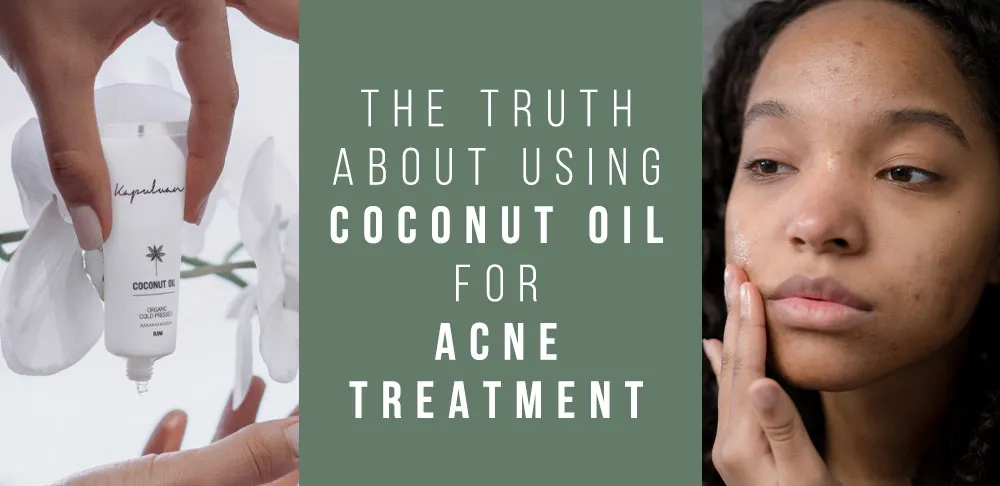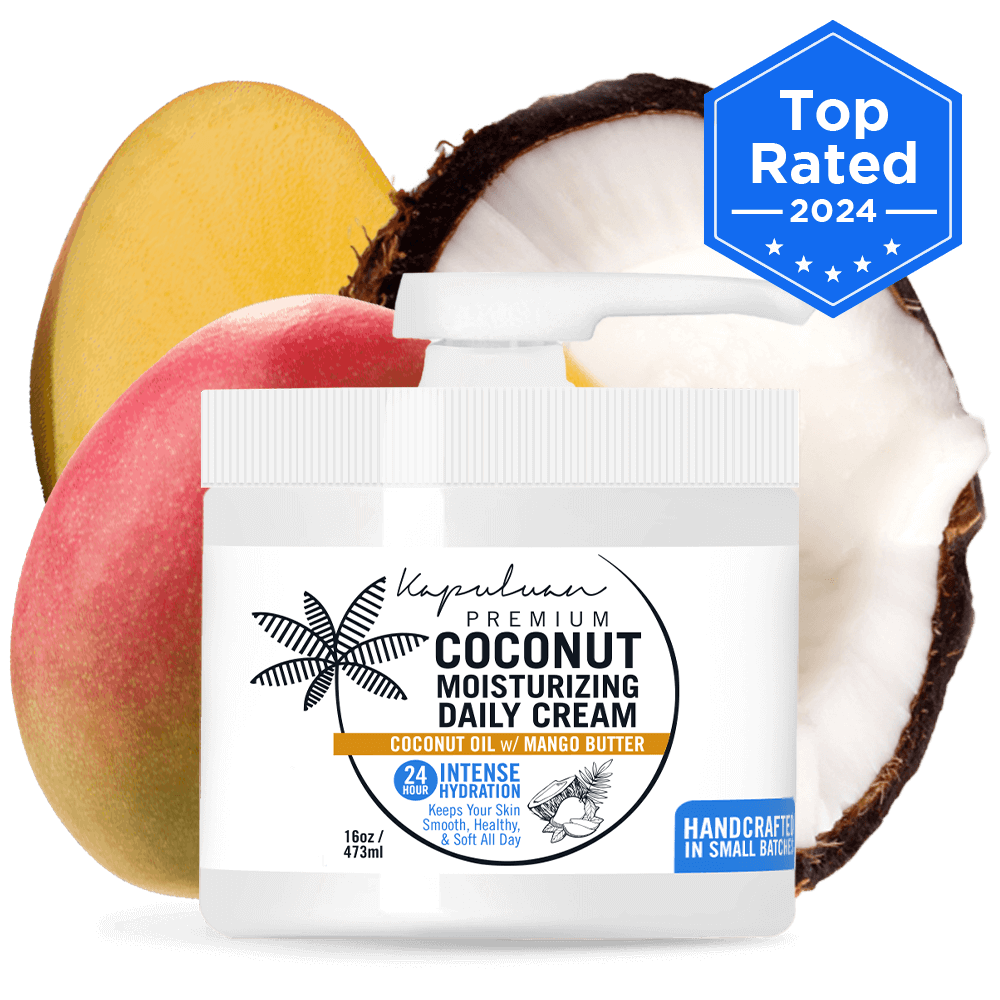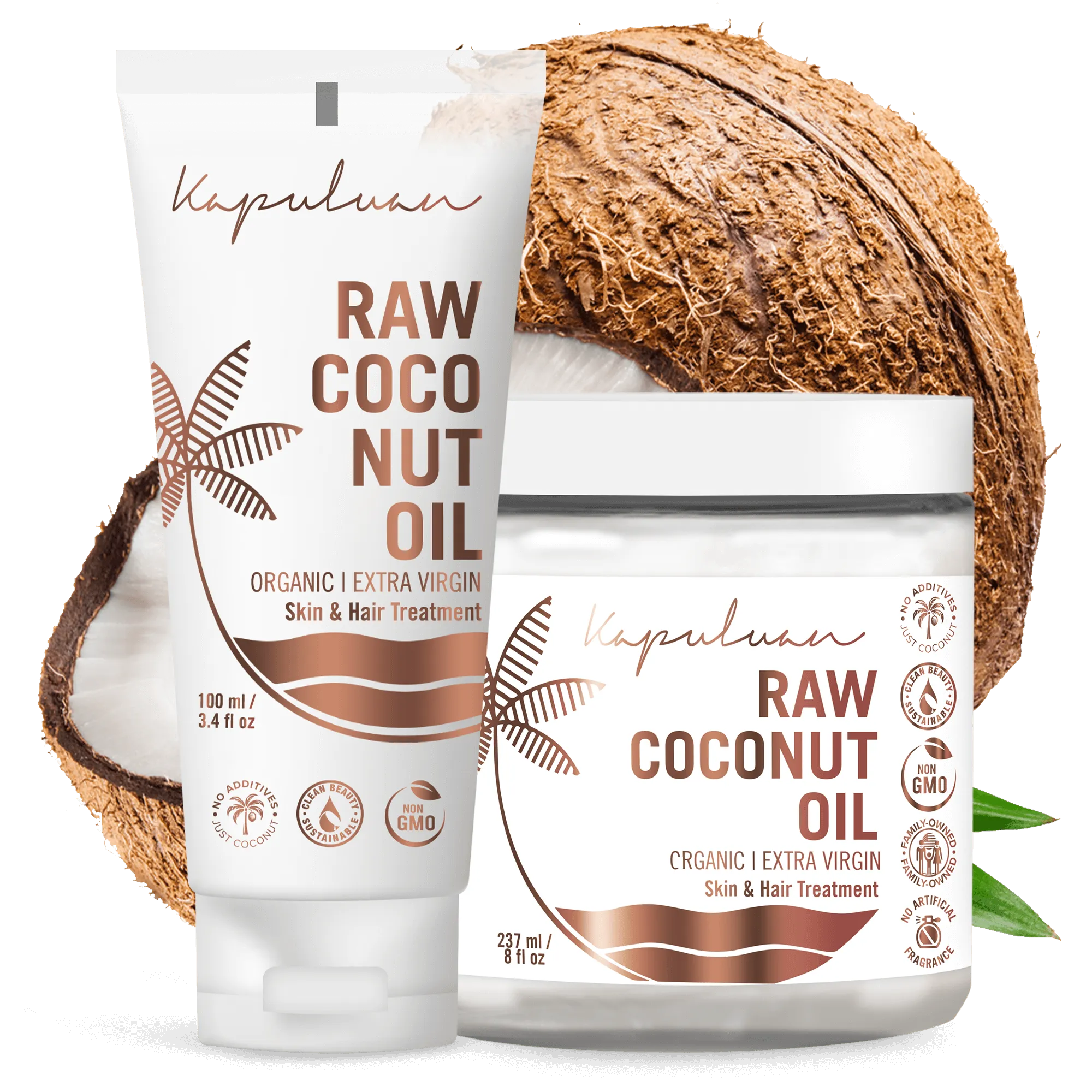Last Updated on July 2, 2024 by Kapuluan

We’ve all heard the buzz about coconut oil’s miraculous benefits, haven’t we? From cooking to hair care, its uses seem endless. But today, we’re diving deep into an often-debated topic: using coconut oil for acne treatment. You may have seen countless articles and testimonials touting it as a natural solution to acne problems. Yet there’s also an equal amount of skepticism surrounding this claim. So, let’s cut through the noise and uncover the truth together.
You might be thinking, “Why should I even consider this? “Well, because there’s nothing quite like the freedom of having clear and healthy skin. It boosts your confidence to face each day head-on without worrying about imperfections. And who wouldn’t want that? Also, if there is merit to these claims about coconut oil for acne treatment – think about what it could mean: A natural remedy right at your fingertips without resorting to harsh chemical treatments! So let’s delve into understanding the cause of acne, explore natural remedies, including coconut oil, investigate scientific backing behind these claims, and discuss potential side effects before deciding on your skincare treatments.
Beyond topical treatments, we should also consider the dietary impact on our skin health. A diet rich in fruits, vegetables, lean proteins, and healthy fats can significantly improve your skin condition. Foods high in omega-3 fatty acids (fish and flaxseeds) or antioxidants (berries and leafy greens) can reduce inflammation, often leading to acne breakouts.
It’s essential not just to rely solely on external applications but also to nourish our bodies from within; after all, beauty truly does start from the inside out! Remember that everyone’s skin is different – what works for one might not work for another. It’s always recommended to do patch tests before fully incorporating new products into your routine or consult a dermatologist if you’re unsure about certain ingredients.
Understanding the Cause of Acne
Let’s dive right in and unravel the mystery behind what’s causing those pesky pimples to pop up on your skin. Many of us believe that acne is a result of poor hygiene or consuming too much junk food, but the truth is more complex than that. The primary culprits are hormonal influences and the impact of our diet on our body’s natural equilibrium. When our hormones fluctuate – as they often do during puberty, menstruation, or periods of stress – they can stimulate excess oil production in our skin. This oil can clog pores and lead to inflammation, which manifests as acne. We also need to consider the role that diet plays in this whole equation. While it might be comforting to think we could banish breakouts simply by washing our faces more frequently or avoiding chocolate like the plague, science suggests otherwise. Certain foods have been linked with increased sebum production and inflammation – two factors significantly contributing to acne development. High-glycemic diets rich in sugars and starches may trigger a spike in insulin levels, further exacerbating hormonal imbalances and increasing oil production. So when it comes down to it, managing acne isn’t just about keeping your face clean; it’s about recognizing and addressing these internal factors too – hormones and diet are at play here! And while there’s no one-size-fits-all solution for everyone dealing with breakouts (as we all have different bodies with unique hormone levels), understanding these underlying causes gives you a better shot at seeking out treatments that can genuinely help manage your acne situation – even if you’ve tried everything else under the sun before!The Properties of Natural Remedies
You’d be amazed at how nature’s toolbox is packed with remedies that can help you take on skin problems. Many of these natural solutions have been used for centuries, their Remedy Origins tracing back to ancient civilizations who understood the Herbal Benefits of using what was readily available in their environment. From turmeric’s anti-inflammatory properties to aloe vera’s soothing effects, nature provides an array of options that can potentially outshine many over-the-counter acne treatments. Expanding our knowledge about natural remedies opens up a world where we’re not solely dependent on synthetic products or expensive treatments. Let’s explore coconut oil as an example. It’s renowned for its moisturizing properties and is loaded with antimicrobial compounds – making it a potent enemy against acne-causing bacteria. The fatty acids present in coconut oil also possess impressive anti-inflammatory properties, which can soothe irritated skin and reduce redness associated with breakouts. Diving into the realm of natural remedies gives us control over what we put on our skin and, ultimately, feeds into our desire for freedom – the freedom to choose healthier, more sustainable options for skincare. Coconut oil isn’t just another trendy ingredient; it is a testament to how powerful nature-derived solutions can be when tackling common skin issues such as acne. So next time your face greets you with an unwanted breakout, consider reaching out for a jar of coconut oil instead of your usual acne cream.The Science Behind the Claims
While it’s easy to sing the praises of natural remedies, it’s critical to peel back the layers and understand the science behind these claims – because, as the old saying goes, ‘the devil is in the details.’ Let’s dive into how coconut oil is extracted and its chemical composition. The most common methods of oil extraction are cold pressing and centrifugation. Cold pressing involves extracting oil from fresh coconuts without applying any heat, which preserves more nutrients in the final product. Centrifugation involves spinning coconuts at high speeds to separate the oil. Both methods yield a pure form of coconut oil that retains its inherent therapeutic properties. Now onto the chemistry part – two major components stand out when we run a chemical composition analysis on coconut oil: lauric acid and capric acid. Lauric acid makes up about 50% of coconut oil’s fat content and has been shown to possess antimicrobial properties. It works by destroying acne-causing bacteria on contact – quite effective for treating inflamed acne lesions! Capric acid also exhibits potent antimicrobial effects against certain strains of bacteria found in acne. So does this mean coconut oil is an absolute solution for acne treatment? Not necessarily so. While it can be beneficial due to its antibacterial properties, everyone’s skin reacts differently to various treatments. Some people might find improvement with their acne, while others may experience clogged pores or increased breakouts due to its heavy consistency. Therefore, if you’re considering using coconut oil for your skincare routine, start slow and monitor your skin closely for any changes or reactions over time.Expert Opinions on the Matter
Now, it’s important to note that not all experts agree on the effectiveness of this natural remedy. Some dermatologists argue that the oil extraction methods can influence how beneficial coconut oil is for acne treatment. They believe cold-pressed virgin coconut oil, which retains most of its natural anti-inflammatory and antimicrobial properties, may help combat acne better than refined versions. On the other hand, some health professionals warn against using any form of coconut oil on acne-prone skin due to its high comedogenic rating, meaning it could potentially clog pores and worsen acne. Moving forward in understanding these diverging viewpoints, we delve into a key aspect: Acne triggers. Experts caution that what works for one person may not work for another because everyone’s skin reacts differently to various substances. Some people’s skin might tolerate coconut oil well and improve their acne condition, while others might experience adverse reactions leading to increased breakouts. Remembering diet, hormones, and stress levels also substantially trigger acne alongside topical treatments is critical. Regarding expert opinions, the verdict is still out on whether or not coconut oil is a reliable treatment for all types of acne. Many recommend patch testing before applying it all over your face or consulting with a dermatologist first about your specific skincare needs and concerns. We understand the allure of natural remedies like coconut oil in giving you a sense of control over your body’s healing process – offering an escape from reliance on pharmaceutical solutions alone – but remember, every individual case is unique and requires personalized care!Personal Experiences with Natural Remedies
Diving into personal experiences with natural remedies is like opening a treasure chest of wisdom and insight, each story offering unique perspectives on what worked and what didn’t in their skincare journey. We’ve all heard or shared our remedy success stories, whether they involve coconut oil, tea tree oil, or other natural ingredients. Personal experimentation holds the key to unlocking your path to clear skin, as everyone’s skin reacts differently. As we delve deeper into these narratives, the usage of coconut oil for acne treatment emerges as a common thread. For some people, applying virgin coconut oil topically has been quite effective due to its antibacterial properties that help reduce acne-causing bacteria. Others have found that it nourishes their skin without triggering breakouts by maintaining an optimal balance of sebum production. However, there are those who experienced clogged pores and increased breakouts because every person’s skin chemistry is unique. While the healing potential of coconut oil cannot be denied based on these individual accounts, it’s essential to remember that not every natural remedy will work for everyone. The varied responses underscore the beauty and complexity of our bodies – no one solution fits all scenarios or individuals. Therefore, we continue to encourage personal experimentation in your pursuit of clearer skin, remembering that patience and observation are vital when trying new treatments like coconut oil for acne.Potential Side Effects
Yet, it’s crucial to tread lightly when exploring these natural remedies as they can sometimes lead to unexpected side effects. Let’s take coconut oil, for instance, which is often touted as a miracle cure for acne. While it has antibacterial and anti-inflammatory properties that can help reduce the severity of breakouts, it may not work the same for everyone. One significant factor we need to consider is the oil quality itself; Oil Quality Importance cannot be overstressed here. An inferior quality oil could contain impurities or additives that might aggravate your skin condition instead of alleviating it. Then there’s also the risk of allergic reactions. As with any new skincare product, you should patch-test coconut oil before applying it all over your face. A small percentage of people are allergic to coconuts and can develop symptoms like redness, itching, and swelling upon contact with coconut oil. Moreover, even if you’re not allergic per se, you may still experience a reaction if your skin isn’t used to this type of oil yet – a phenomenon known as ‘contact dermatitis.’ Hence always remember: proceed with caution. Coupling our desire for freedom from chemical-laden treatments with an awareness of potential side effects gives us an empowering perspective on natural acne remedies like coconut oil. It’s about balancing nature’s bounty and our body responses – creating a personalized skincare routine that caters specifically to our unique needs and sensitivities. By being aware of factors like Oil Quality Importance and possible Allergic Reactions, we’re better equipped to make informed decisions about what goes on our skin – giving us greater control over our journey towards a clear complexion!Other Natural Alternatives for Skin Care
While we’ve already explored the realm of coconut oil, there’s a whole world of other natural alternatives out there just waiting to be discovered, like an untapped gold mine for our skincare routines. Herbal skincare has recently gained popularity due to its gentle and nature-friendly approach. Many of these remedies have been used by generations past, and continue to prove their effectiveness today. Natural ingredients are kinder on our skin and promote more sustainable practices. Let’s dive into a few more herbal skincare options that can benefit acne treatment. The table below paints a vivid picture:| Ingredient | Benefit | How To Use |
|---|---|---|
| Aloe Vera | Reduces inflammation and accelerates the healing process | Apply the fresh gel directly onto the affected area |
| Tea Tree Oil | Powerful antibacterial properties | Dilute with a carrier oil before applying topically |
| Turmeric | Anti-inflammatory and antioxidant benefits | Mix with honey or yogurt to create a mask |





